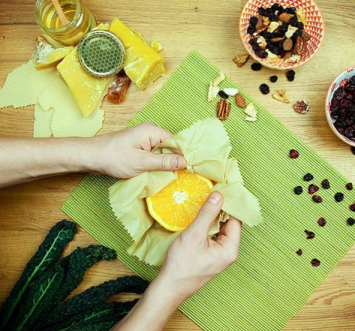Apepak is an innovative material made from cotton and beeswax that aims to replace plastic in kitchen packaging applications.
Apepak is a natural, ecological and ethical product, a revolution in the kitchen industry where it will have to compete with the ubiquitous plastic but it has a look at the future of ecological sustainability since it is 100% recyclable. The paper is made from biologic cotton from sustainable supply manufactures plus a blend of biologica beeswax, pine resin and jojoba oil. This particular composition makes the material malleable, antiseptic and thermoforming.
Which features it has
The heat of the hands is able to model Apepak around a sandwich, fruit or any other type of food. As soon as it is folded, in a couple of seconds Apepak will cool down and keep its shape, making the wrapping sealed. Another interesting aspect is that Apepak is washable, reusable and 100% biodegradable. The only attention is not to exceed 30 degrees Celsius during washing to not dissolve the beeswax and damage the sealing properties.

Reusable and recyclable
The sheet can be reused and can last up to one year, or however until it loses the sealing property of beeswax. Apepaxt can be used in the freezer, but being breathable, it is not suitable for any type of food to be stored. Due to its composition, Apepak smells slightly of beeswax, with the fragrance changing depending on the seasons and the flowers from which the bees get the wax. By the way, the smell dissipates after the first uses and the first washes. The material has passed all the
The sheet can be reused and can last up to one year, or however until it loses the sealing property of beeswax, it can be used in the freezer, but being breathable, it is not suitable for any type of food to be stored. Due to its composition, Apepak smells slightly of beeswax, with the fragrance changing depending on the seasons and the flowers from which the bees get the wax. By the way, the smell dissipates after the first uses and the first washes. The material has passed all the controls in the sector, including MOCA certification (Materials and Objects in Contact with Food) and HACCP certification (Hazard Analysis and Critical Control Points) and is certified for contact with food even in professional environments.
Why is Apex ethical?
The company underline the aspect of ethical production because the material is produced by a cooperative that offers social and health services, educational, training and in addition promotes the employment of disadvantaged people, such as people with addiction problems, young people at risk, etc. Apepak can have a huge environmental impact: the use of an Apepak sheet makes the environment respect 30 square cm of plastic and at the same time supports a working day of 1000 honey bees and 30 minutes of work of a member of the cooperative. In addition, the use of beeswax helps the farmers to take care for their cultures and provides a supplementary income that can help them to keep their swarms healthy and further improve the quality of the product supplied.
The introduction on the market
The company has several challenges to deal with, starting from cost reduction and market competitiveness, plus the success of the product can create a vicious circle involving the final producer together with the textile companies that supply the cotton and the local beekeepers who care for the bees, producing a positive side effect that will involve more secondary sectors, with a further positive impact on the environment.